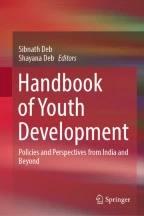
Though India has achieved replacement levels of fertility (a Total Fertility Rate of 2 children per woman) in 2020, the absolute population size will continue to increase due to population momentum. The demographic transition, from high fertility and mortality conditions to low levels over a period, brings about changes in the age structure of the population with a shift towards a smaller share of the young population (0–14 years) and an increasingly share of the working-age population (15–59 years), which lowers the dependency ratio. After a lag of a few decades, eventually the share of older persons increases, which results in the increase in the dependency ratio. The period of potential demographic dividend occurs when the dependency ratio remains low. However, the demographic dividend phases do not automatically translate into economic growth. To harness the demographic dividend fully, policies and programmatic measures are required on an urgent basis. This chapter brings out the importance of higher investments in health and education, focusing more on vocational and skill-oriented education for young people, making reproductive health care services accessible on a rights-based approach with a focus on the marginalized population, women’s empowerment, reducing gender inequality and increasing female workforce participation. Inter-regional diversity in demographic transition in India provides a unique situation, whereby the north-central region of the country will serve as the reservoir of the working age population in future. Considering such diversities, a differential planning approach is needed to reap the benefits of demographic dividend.
Authors are from UNFPA-India working as (1) Population Dynamics & Research Specialist; (2) Data Analyst and (3) Chief, Policy and Partnerships. The views expressed in the paper are that of the authors and does not necessarily reflect those of the organisations with which they are affiliated. The paper was presented in ‘Youth Global Summit: An International Conference’ during March 15–17, 2022 organized by Rajiv Gandhi National Institute of Youth Development, Chennai.
This is a preview of subscription content, log in via an institution to check access.